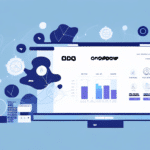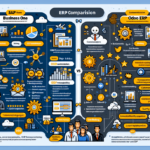Introduction to ERP Systems
Enterprise Resource Planning (ERP) systems have become essential tools for modern businesses, enabling efficient management of resources across various departments. These systems integrate functions such as finance, sales, inventory, production, and customer relationship management into a unified platform. By providing real-time data and analytics, ERP systems empower businesses to make informed decisions swiftly, streamline processes, reduce operational costs, and enhance overall efficiency.
Overview of Priority ERP and Odoo ERP
Priority ERP
Priority ERP is a cloud-based solution developed by Priority Software, a global leader in ERP solutions. It is renowned for its user-friendly interface and comprehensive feature set, including financial management, inventory control, and customer relationship management. Priority ERP also offers real-time data analytics, facilitating informed decision-making based on accurate and up-to-date information.
Odoo ERP
Odoo ERP is an open-source ERP system that provides extensive customization capabilities. Its modular architecture allows businesses to add or remove functionalities as needed, making it highly adaptable to specific business requirements. Odoo ERP is also known for its cost-effectiveness, as it is free to download and use, with additional modules available for purchase to enhance its functionality.
Key Features Comparison
Functionality
- Priority ERP: Offers robust financial management, project management, inventory control, and customer relationship management.
- Odoo ERP: Provides a wide range of modules, including sales, purchasing, manufacturing, inventory, and marketing automation.
Customization
- Priority ERP: Limited customization options but integrates seamlessly with other Priority Software packages.
- Odoo ERP: Highly customizable with numerous third-party integrations and a strong developer community.
Scalability
- Priority ERP: Suitable for medium to large enterprises with complex operational needs.
- Odoo ERP: Ideal for startups and small to medium-sized businesses due to its flexible and scalable nature.
Pros and Cons
Priority ERP
- Pros: Comprehensive financial modules, robust project management, and excellent support for distributed teams.
- Cons: Higher cost and less flexibility in customization compared to open-source alternatives.
Odoo ERP
- Pros: Highly customizable, cost-effective, and a vast library of third-party applications.
- Cons: May require technical expertise for customization and relies on community support for troubleshooting.
Cost Analysis
The cost of implementing an ERP system varies based on business size, required features, and customization level. Priority ERP typically involves higher upfront costs due to licensing fees and comprehensive feature sets tailored for larger organizations. In contrast, Odoo ERP offers a free base version with additional modules available for purchase, making it a more affordable option for small to medium-sized businesses. However, costs can escalate with extensive customization and the addition of multiple modules.
According to a Capterra report, Odoo ERP is generally more cost-effective for businesses with limited budgets, while Priority ERP may offer better value for larger enterprises needing extensive functionality out of the box.
Customization and Scalability
Priority ERP
While Priority ERP offers limited customization, it integrates seamlessly with other Priority Software products, providing a comprehensive suite of business solutions. This makes it easier for large organizations to scale their operations without significant changes to their existing systems.
Odoo ERP
Odoo ERP stands out for its high level of customization. Businesses can tailor the system to their specific needs by adding or developing modules, making it highly scalable. However, this flexibility requires technical expertise to implement and maintain customizations effectively.
User Experience and Support
User Interface
Priority ERP features a structured and straightforward interface, which is ideal for users who prefer a clear and organized layout. On the other hand, Odoo ERP boasts a more visually appealing and intuitive user interface, enhancing the overall user experience.
Customer Support
Priority ERP offers comprehensive customer support, including phone and email assistance, as well as regular software updates. In contrast, Odoo ERP relies heavily on its active open-source community for support, which can be a limitation for businesses requiring immediate and dedicated assistance.
Security and Integration
Security Features
Both Priority ERP and Odoo ERP prioritize security with features such as role-based access controls, two-factor authentication, and data encryption. However, Priority ERP offers a more comprehensive security framework embedded in its cloud platform, ensuring robust protection for businesses with distributed teams.
Integration Capabilities
Integration with other business tools is crucial for seamless operations. Priority ERP provides numerous pre-built connectors for various third-party applications, facilitating smooth integration. Meanwhile, Odoo ERP supports extensive integrations through its modular architecture, allowing businesses to connect with a wide array of external systems and applications.
Industry-Specific Solutions
Both ERP systems cater to diverse industries, but each has specific strengths. Priority ERP is particularly well-suited for manufacturing, distribution, healthcare, and financial services due to its comprehensive feature set tailored for complex operations. In contrast, Odoo ERP's flexibility makes it adaptable to a wide range of industries, including retail, services, and education, allowing businesses to customize the system according to their unique requirements.
Conclusion: Choosing the Right ERP for Your Business
Choosing between Priority ERP and Odoo ERP depends on your business's specific needs, size, budget, and desired level of customization. Priority ERP is ideal for larger, more complex organizations seeking a comprehensive and robust ERP solution with strong support mechanisms. Conversely, Odoo ERP is an excellent choice for startups and small to medium-sized businesses looking for a flexible, customizable, and cost-effective ERP system.
Before making a decision, carefully evaluate your business requirements, consider potential future growth, and assess the total cost of ownership, including implementation and maintenance. Consulting with ERP specialists and conducting a thorough needs analysis can also help in selecting the most appropriate ERP system for your organization.




















